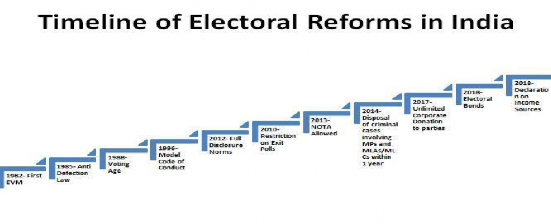Political Reforms
The underlying democratic foundations are severely lacking in the political system in India. No electoral system can provide real and effective representation for the larger societal aspirations unless the political system underlying it is not democratic in real terms. Some of the areas of concern are:
♤ Institutionalization of political parties: There is a need for a comprehensive legislation to regulate party activities, criteria for registration as a national or State party, derecognition of parties.
♤ Structural and organizational reforms: Party organizations-- National, State and local levels; Inner party democracy-- regular party elections, recruitment of party cadres, socialization, development and training, research, thinking and policy planning activities of the party.
♤ Party system and governance: There must be mechanisms to make parties viable instruments of good governance. Deeper political reforms can be presented in three interrelated but distinct parts:
o Registration and de-registration of political parties: The authority for registration, de- registration, recognition and de-recognition of parties and for appointing the body of auditors should be the Election Commission. The decisions of the ECI should be final subject to review only by the Supreme Court of India.
o Internal democracy in political parties: It is absolutely beyond any doubt that political parties are sine qua non of a representative democracy. Political parties which function in a democracy, and claim to be defenders of democracy at every opportunity should function in a democratic manner in their own internal functioning.
Lack of internal democracy makes political parties over-centralized.
Moreover, in a party, which does not have internal democracy, power will be exercised more remotely from the members of the party. This increases the distance between authority and accountability.
Additionally, in large political parties without internal democracy, there will be very few decision makers.
Hence, provisions should be made to introduce inner-party democracy within the political parties. This should include mandatory secret ballot voting for all elections for all inner party posts and selection of candidates by the registered members, overseen by Election Commission of India.
o Financial transparency in political parties: This is also one of the fundamental deeper political reforms that is a necessary precondition that must be satisfied before any meaningful electoral reforms can actually take place on the ground. Bulk of the donations is currently from unknown sources of funds and the introduction of ‘Electoral Bonds’ has made the financial transparency even more opaque than earlier.
Political parties should be required to maintain proper accounts in predetermined account heads and such accounts should be audited by auditors recommended and approved by the Comptroller and Auditor General of India (CAG), and available for the information of the public.
For bringing a sense of discipline and order into the working of our political system and in the conduct of elections, it is necessary to provide by law for the formation, functioning, income and expenditure and the internal working of the recognized political parties both at the national and State level. There must be a comprehensive law be enacted to regulate the functioning of political parties.

